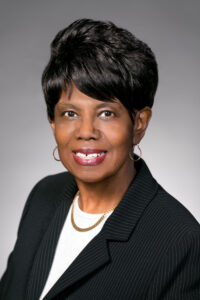Writer: Max Crampton-Thomas
 2 min read May 2021 — Higher education is preparing today’s talent for the future of work by focusing on programs and disciplines that will be driving the demand for skilled professionals. Barbara Gaba, president of Atlantic Cape Community College, shares her institution’s efforts in that regard.
2 min read May 2021 — Higher education is preparing today’s talent for the future of work by focusing on programs and disciplines that will be driving the demand for skilled professionals. Barbara Gaba, president of Atlantic Cape Community College, shares her institution’s efforts in that regard.
What has been a key highlight from the past year?
One of the highlights of this past year is the Community College Opportunity Grant Program (CCOG). That bill was passed by the New Jersey legislature and signed into law by Gov. Phil Murphy, making it a permanent state financial aid program. This is a last-dollar scholarship for students to attend community college. It is geared toward people who earn $65,000 or less. This is a critical opportunity for students who may not be able to afford to go to college.
We were also awarded a few grants in the fall, which were essential for supporting workforce development initiatives as we recover, rebuild and rebound. Atlantic was awarded $342,000 in workforce training grants through the New Jersey Endurance Grant to train dislocated workers in Atlantic and Cape May counties. The program is going to provide participants with short-term certification training and programs such as Certified Clinical Medical Assistant, Certified Fundamentals Cook and Emergency Medical Technician. The Casino Reinvestment Development Authority (CRDA) approved funding for a grant of $492,000 to Atlantic to provide training under the Atlantic City Works Program, which addresses the training needs of Atlantic City residents who are unemployed or underemployed. The program will assist casino workers by expanding their training to help ensure continued employment and access to promotional opportunities.
Our hope is that when we are past the pandemic, residents of Atlantic and Cape May counties will look to Atlantic Cape as a place to restart their lives after being on pause for so long. Despite all the challenges, we maintained our academic and our business continuity and we are getting ready to move forward.
How has the college strategized its workforce development offerings during this time?
Our Office of Workforce Development works closely with our business communities. We sit on several of the boards — the Atlantic County Economic Alliance (ACEA), the Greater Atlantic City Chamber of Commerce, and the Atlantic County Workforce Development Board. We are very much aware of and attuned to what is happening with regard to workforce development. In this part of the state, we had been very focused on hospitality and tourism, both of which took a big hit during the pandemic. We are getting ready to be a part of a critical initiative related to the wind industry. Wind farms are going to be built off the coast of Atlantic City, and we are planning to be very much a part of establishing a global wind organization and creating certified basic safety and sea survival training programs, including a support facility at our Atlantic City campus. To do so, we are applying for a $3.3 million grant for those specific goals.
What is your take on COVID-related learning loss?
We are concerned across higher education regarding the learning loss that occurred at the high school level during this past year. We intend to continue to reach out through virtual events. We reach out to high-school counselors and parents to participate in what we call virtual information sessions. We do offer GED and other high school preparation programs. It has been a challenge because students have not been in school. We realize that when they do come back, we are going to have work to do, but we are prepared in terms of the programs that we offer to assist them.
Moreover, there will be no tuition increase; it will remain flat throughout 2021. We are very sensitive to the environment and realize that many people are struggling, particularly in this area. Our high reliance on tourism and the gaming industry translated into significant job losses. Our unemployment rate was among the highest in the state. We really needed to be able to help people in that regard, so we did not want to put any further financial burdens on students.
How do you see the near-term playing out for the region’s higher education sector?
It is going to be a challenge, but we are anxiously looking forward to going back in the fall. We are preparing for that as we speak. It is critical that we get back to normal as much as we can. We realize too that when we talk about normal, we really do not want to go back to what we were before. We learned a lot of lessons and our top priority is getting students back into the classroom. Despite all the challenges that we face with the pandemic, it has created some opportunities as well. We want to do better and one of the lessons of the pandemic is that there is a digital divide that we need to address. Many students lack the means and technology required for online learning. Going back, we are going to provide computer laptops on loan for students. We are going to continue providing our offerings in the virtual space. Academic advising, financial aid preparation, meeting with a faculty member, all that used to be done in person. When we went remote, that was the only way to do it and it worked well. In parallel, we look to continue to be on-site.
For more information, visit:
